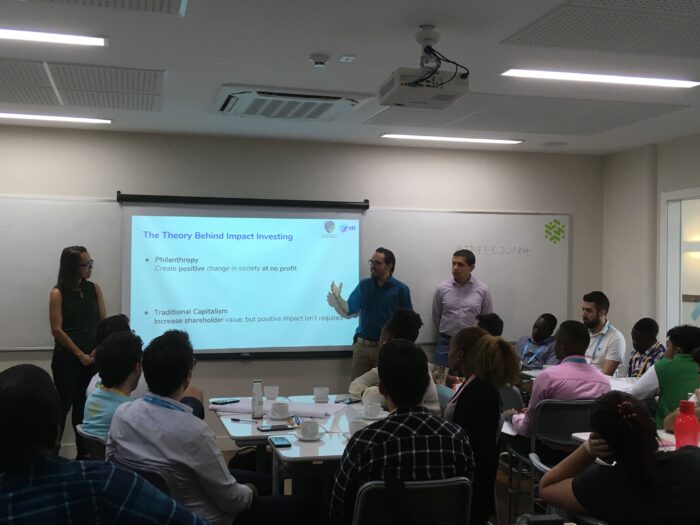Decision Making – Cognitive Dissonance
September 13, 2022 ~ Written by: W.B. “Bud” Kirchner
Approx. read time: 8 minutes
Purpose
“Unsuccessful people make decisions based on their current situation; successful people make decisions based on where they want to be.” – Anonymous
This article is generated in response to two factors (1) current economic condition – as the economy continues its gyrations, decision-making is challenged by “pitfalls’ beyond the norm, and (2) the above coincides with the launch of our latest cluster of training programs sponsored by the Kirchner Impact Foundation.
If I might reiterate – decision-making (especially cognitive dissonance) seems to be amongst the most popular topics within the context of the Business Brain Model and I am particularly proud that this resource is an integral part of our core content in our Kirchner Investment Academy.
Compendium
An important perspective related to decision-making is cognitive dissonance which is generally described as habitual ways of thinking that are negatively biased.
What would a summary of the most significant pitfalls look like? As it turns out, two of the “definitive” lists have considerable overlap (rare amongst academics) so I cite Cognitive Distortions: 22 Examples & Worksheets (& PDF) and 10 Thinking Errors That Will Crush Your Mental Strength which is in agreement on this ‘top 8’.
The following can serve as a ‘field guide’ of landmines for new and experienced investors and managers to keep in mind:
- All-or-Nothing Thinking
- A cognitive distortion that performance is totally good or totally bad
- Overgeneralizing
- Often takes the form of making sweeping statements often involving oversimplification
- Discounting the Positive
- Reject positive experience usually by categorizing it as not counting. Can evolve to only considering the negative
- Mind Reading
- Confidence that you can intuitively read others’ thoughts and feelings without normal means of communication
- Fortune Telling
- Predicting the future is often based on ‘otherworldly’ techniques
- Emotional Reasoning
- Interpretating situations through subjective feelings vs. objective evidence
- Labeling and Mislabeling
- Often manifested by overgeneralization
- Personalization
- Assuming things include the individual personally when they are not relevant
Supplemental
“Good decisions come from experience, and experience comes from bad decisions.” – Anonymous
I would be remiss if I did not cite a related article entitled “Cognitive biases and brain biology help explain why facts don’t change minds” (#3)
The author focuses on why facts don’t change minds – another relevant perspective to consider in decision making – especially when it gets ‘close to home’.
As the author describes:
- “Your brain is hard-wired to protect you – which can lead to reinforcing your opinions and beliefs, even when they’re misguided. Winning a debate or an argument triggers a flood of hormones, including dopamine and adrenaline.”
- “Moreover, in situations of high stress or distrust, your body releases another hormone, cortisol. It can hijack your advanced thought processes, reason, and logic – what psychologists call the executive functions of your brain.”
- “The desire to be right combined with the brain’s protective mechanisms make it that much harder to change opinions and beliefs, even in the presence of new information.”
Clearly, the above is food for thought as one contemplates complications beyond the previous “field guide” and with this in mind, I also share the following additional context.
We need to seek out any approach/technique that might reduce our errors in decision-making – what is described as “the brain’s tendency to make errors of judgment systematically” (#4). In this context, I came across the work of Austin Perlmutter M.D (#5) as it relates to environment and biology:
- “Research has shown that certain parts of the brain are especially involved in decision-making, and when they are damaged or otherwise compromised, the quality of our decision-making suffers.”
- “Alzheimer’s that may lead people to make less healthy choices.”
- “For example, experiencing high levels of stress appears to increase our preference for more impulsive choices, and sleep deficits (as well as stress) increase our reliance on habitual, unconscious choices instead of well-thought-out decisions.”
- “Prioritizing sleep (sleep-deprived people tend to make less healthy choices)”
- “Getting in a daily dose of movement (people may make healthier decisions after a round of exercise)”
- “Engaging in daily stress-mitigation techniques (like meditation or breathing exercises).”
- “Even a short burst of exposure to nature may decrease impulsive choices.”
Sharing with Others
“Give a person a fish and you feed them for a day. Teach a person how to fish and you feed them for a lifetime” – Based on a quote from Chinese philosopher Lao Tzu, Founder of Taoism
I am proud to say that our corporate culture at Kirchner Group has embraced this paradigm of decision-making importance for almost four decades. In doing so, we have created an environment within which we can reflect/relate to the world around us and help address problems (and ‘be compassionate’) at scale and in various contexts. Interestingly enough, it all started with a pragmatic orientation that every company can be improved, and every company should improve the world around them.
Further leveraging this context, we have also established a related reputation for building and rebuilding important business and social paradigms based on our deep entrepreneurial orientation.
We have been helping small and medium-sized businesses through their entire company lifecycle from commercialization to liquidity for over 35 years. We are also actively involved as a principal and advisor in numerous other philanthropic and impact activities centered on challenges such as enriching and protecting the lives of individuals with special needs (www.cdhaf.org), food security, and entrepreneurial ecosystem development (www.kirchnerimpact.com).
Kirchner Group is (I would hope) a culture where we are committed to making the world a better place. With this in mind, we have committed to sharing as much as possible. As previously mentioned, we are so committed to a disciplined approach to decision-making that it has become a major point of the curriculum in our Kirchner Investment Academy.

This program, led by Adrian Garcia, is an intensive training program that demystifies the investment process for entrepreneurs and introduces eager, yet perhaps inexperienced, “angel” investors to the art of deploying disciplined capital. The program has been held more than 20 times in various formats and has provided instruction to over 800 entrepreneurs and potential angel investors around the world.
This course elaborates on the traditional concepts of investment finance, also including a more complete view of impact investing and the human factor in investment processes promoting Kirchner Group’s approach of “Creating Value while Promoting Values.” The program also takes some of the most significant teachings of the “Kirchner Food Fellowship” program, as well as many readings and reflections from this “Exploring the Business Brain” platform.
We continue to expand the reach of the program:
- We recently held an online academy for entrepreneurs based in Leon Mexico in partnership with the Innovation Directorship of the Municipality of Leon.
- Upcoming academies include:
- One in partnership with University Zamorano – a leading AG university in Latin America
- An in-person program in Costa Rica in partnership with CRUSA (Costa Rica United States Foundation for Cooperation).
- Upcoming program for HBCU students in partnership with FFAR (Foundation for Food & Agriculture Research) and The Rockefeller Foundation
As the above illustrates, we are so convinced of the need for a decision-making context that we are introducing it to the best and brightest early in their career.
Conclusion
“Indecision is a decision.” – Anonymous
Clearly, it is worth doing one’s homework as one prepares for decision-making, a complicated process that is constantly being updated in breadth if not depth.
Decision Making: We’ve been here before:
- A Decision-Making ‘Swiss Army Knife’
- From the Sublime to the Ridiculous
- Can Incongruities and Similarities Take You to The Same Place?
- 10 Paradoxes That Will Bite You in the Ass (3rd in Series)
- How To Use Your Vagal Lifeline
- A Powerful Arrow for Your Catastrophe Quiver
- A Metaphor for The Times
- Worrier vs. Warrior
- 10 Paradoxes That Will Bite You in the Ass (2nd in Series) “Post hoc ergo propter hoc”
- The brand strategy discontinuation between what business does and what science knows [GUEST POST]
- How To Exercise Your Decision-Making Muscle
- Pattern Recognition and its Role in Decision Making
- This Will Take Your Breath Away
- Yin and Yang: Finding Balance Between Tacit & Explicit Knowledge
- 10 Paradoxes That Will Bite You in the Ass (1st in Series)
- How Does Chronic Stress Impact Decision Making?
- Decision Making: A New Approach to Groupthink
- It’s Not Stress That Kills Us, it is Our Reaction to It
- The Stone Age Didn’t End Because They Ran Out of Stones
- Deciding How to Decide How to Make Decisions
- How Embodied is Your Cognition? What is Principle?
- A Neuroscience Perspective on Enhancing Innovation
- Thaler Explained Why It Makes Sense That Things Don’t Make Sense
- Expect The Worst? It Doesn’t Mean You Are Pathological
- TPN vs. DMN – Brain Structure and Mindfulness
- TPN vs. DMN – Neural Mechanisms and Mindfulness
- Human Nature as A Cause
- Financialization As a Symptom
- Daniel Kahneman Meets Dalai Lama
- Our Wiring Isn’t Getting Any Better?!?!
- Paradoxes To Live By
- Would you like to leave the kitchen or learn how to deal with the heat?
- It is Past Time to Slaughter Your Sacred Cow
- Why your gray and white matter matters
- Hooked on Hedonics: Is Happiness the next Holy Grail of Business?
- How You Can Get a Date
- Positioning Between the Poles: Is right really right and wrong really wrong?
- How Do You Know Who You Can Trust?
- The Best Ways to Spot a Liar
- Freaking out about the guy the “Freakonomics” guy freaks out about
- Einfühlung
- Your brain: How “committees” on terrorism, concerts and weddings guide you
- Is your Radar set to Detect Cognitive Traps?
- The Ironic Magnitude of Cognitive Biases
- A Field Guide to Thinking Errors
- Arming Yourself in the Battle with Your Mind
- People Based Due Diligence
- The cheesy truth about decision making….
- Is there Something Wrong with our Wiring?
- Are you Creating Environments Designed to Enhance Relationships?
Bibliography
- Cognitive Distortions: 22 Examples & Worksheets (& PDF)
- 10 Thinking Errors That Will Crush Your Mental Strength
- Keith M. Bellizzi – “Cognitive biases and brain biology help explain why facts don’t change minds”
- William Hwang Psy.D. – 3 Mistakes We Make Every Day (And How to Avoid Making Them)
- Austin Perlmutter M.D. – 3 Simple Ways to Improve Your Decision-Making
- Paul S. Rosenbloom, Christian Lebiere and John E. Laird – “Cross-pollination among neuroscience, psychology and AI research yields a foundational understanding of thinking”

